ELA Launches Groundbreaking Virtual Reality Filmmaking Course
Who will be the Alfred Hitchcock or Martin Scorsese of virtual reality filmmaking? Emerson College Los Angeles (ELA) hopes he or she is roaming the hallways of its iconic building on Sunset Boulevard.
In January, ELA launched the course Virtual Reality Filmmaking, a class designed to explore the burgeoning field of live action filmmaking for virtual reality (VR) headsets. Students in the course experience cutting-edge VR films, animations, and video games. They study the latest virtual reality media and technology, learn how to operate a multi-camera VR shooting rig, use the software tools necessary to create 360-degree spherical films, and create their own immersive shorts. By the end of the course, students learn the skills necessary to craft a compelling VR experience and emerge with a portfolio piece good enough to secure a job in the VR field.
“This is one of, if not the first undergraduate VR filmmaking course anywhere,” said Micah Wright, who teaches the class. “The marketplace for VR is coming and Emerson College understands that.”
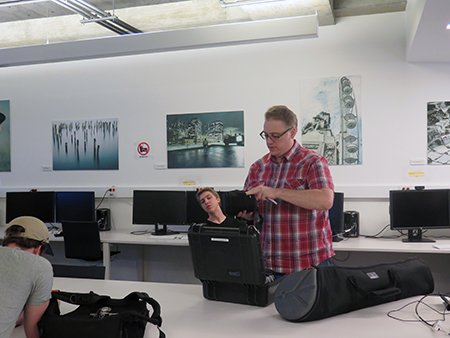
Micah Wright looks at equipment during his Virtual Reality Filmmaking course at Emerson College Los Angeles. Photo/Daryl Paranada
The 10 students enrolled in the course not only have an opportunity to learn about VR, but they also get a chance to experiment with new ways of telling stories in a field where the rules of storytelling are still being written.
“I’m very excited about trying to make content in this new medium because we have a deeper connection to it,” said Jack Siberine ’16, a Visual & Media Arts (VMA) major taking the course. “It affects people more deeply than I think film can these days.”
Siberine got his first taste of VR in Boston, when a friend showed him a film made by the company Vrse. He describes watching the film Evolution of Verse in the Google Cardboard virtual reality headset, seeing a train barrel towards him, and jumping backwards. The immersive experience helped him realize that he wanted to do more in the medium, which he says melds two of his passions, art and science.
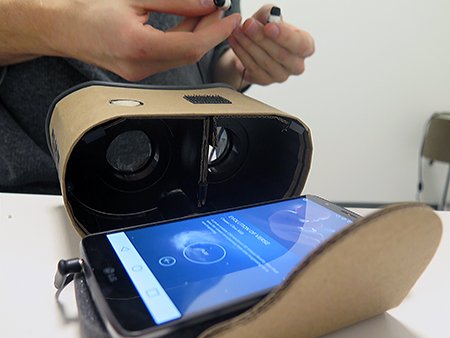
Jack Siberine ’16 prepares to play the VR film Evolution of Verse in his RYOT cardboard virtual reality headset. Photo/Daryl Paranada
“In the next five years or so, VR will come to surpass one of the major arts—TV, movies, or video games,” said Wright, who has written for video games like Call of Duty: Black Ops II and worked in film, television, and comic books. “It’s going to make more money and it’s going to be a bigger business.”
Wright’s interest in virtual reality was sparked after working on theBluVR, an immersive marine experience that recreates the look and feel of the ocean. Realizing that there were many opportunities in the rapidly expanding field, he started researching more about it and experimenting with his own VR short films.
In late spring 2015, he proposed a VR filmmaking course to Kevin Bright, ELA’s vice president and founding director, and Dr. Mikhail Gershovich, ELA’s director of academic planning and digital learning. The response was enthusiastic.
“This course presented a timely opportunity for us to pilot something truly innovative and unique that could have a tremendous impact on the College and our students going forward,” said Gershovich. “Because the language of narrative storytelling in VR is only just beginning to emerge, this course offers our students a chance to contribute meaningfully to the development of a new art form—and that’s rare and exciting.”
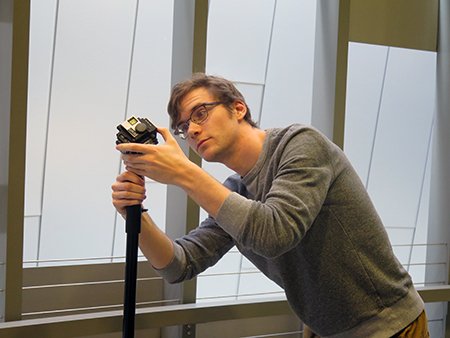
Jack Siberine ’16 prepares to film with a GoPro rig. Photo/Daryl Paranada
Teaching VR filmmaking is a natural extension for Emerson. The College’s Visual & Media Arts Department at the main campus in Boston, has been a leader in teaching innovative media making.
“Our students are interested in all kinds of filmmaking and how to use each format most effectively to tell a story. VR filmmaking is on a path to to becoming a standard addition to film experiences for audiences, which makes it especially exciting for our students who can play a leading role in shaping the way these films are made,” said Professor John Craig Freeman, who teaches multiple media making classes including 3D computer gaming, computer animation, and virtual and augmented reality.
While there have been attempts to commercialize virtual reality in the past (remember Nintendo’s failed Virtual Boy back in the ‘90s?), evidence indicates that VR is here to stay—and in a big way. The Britain-based market research firm Juniper Research identified 2016 as a watershed year for virtual reality. At least six multi-billion-dollar corporations have invested heavily in virtual reality, including Facebook, which bought the virtual reality pioneer company Oculus VR in 2014 for $2 billion. Investment bank Goldman Sachs predicted that the virtual and augmented reality industry will reach $80 billion by 2025.
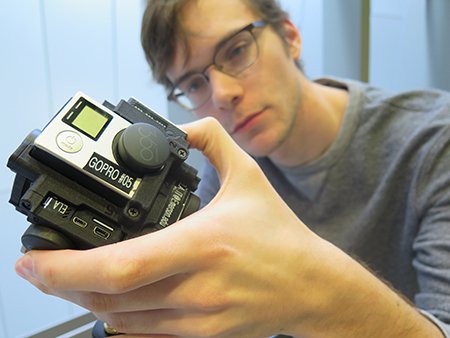
Jack Siberine ’16 says the virtual reality short film he is working on for the course focuses on memories. Photo/Daryl Paranada
To help get the class off the ground, ELA secured the necessary equipment, including multiple GoPro cameras and rigs. Wright used his own experience experimenting—and failing—with shooting VR short films to help create a first draft of the syllabus and faculty members from Emerson’s VMA Department helped to refine it.
Jessica Asch ’16, a VMA major, says one of her favorite aspects of the class is going to conventions and meeting people she and her classmates might want to work for in the future. For her first VR short film, Asch tied the multi-camera GoPro rig to a fishing line, hung it over a tree branch and dropped it towards a phone on the ground. She dropped the GoPro rig multiple times on various tree branches to simulate the feeling of dropping into an object.
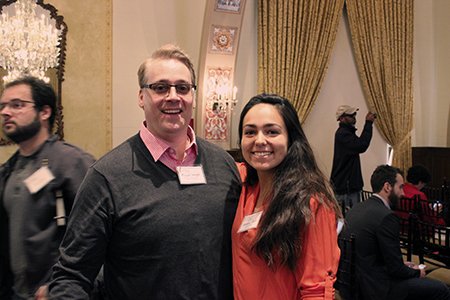
Micah Wright and Jessica Asch ’16 attend the E2: Evolution of Entertainment Conference on February 19. This year’s conference focused on the business of virtual reality entertainment. Photo/Mikhail Gershovich
“At the end of the class, I want to have a film that’s clean and that I can show people,” said Asch, who’s hoping to stay in California and intern for a VR company after graduating. “I’m in love with VR and I’m glad to be out here in LA learning more about the medium. It’s an incredible opportunity.”
Siberene, who is interning at the media company RYOT, hopes to become an entrepreneur in the VR field one day. For now, he’s spending his days researching the future of VR at his internship and using equipment from RYOT and Emerson to film VR shorts.
“This is a really fast-moving industry right now,” said Siberine, who hopes to land a job in the industry after graduating. “I was lucky to get interested early and I’m lucky that Emerson offers this kind of class because I’ve been able to build a community with other people interested in VR.”
Categories